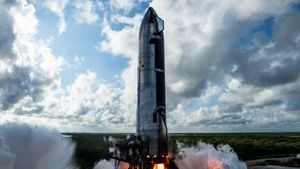Laura Helmuth, the editor-in-chief of Scientific American, has stepped down from her position following intense backlash over controversial comments she made during the recent election. Her resignation has sparked discussions surrounding the need for journalistic impartiality versus personal expression, particularly within esteemed publications known for their scientifically grounded reporting.
The controversy began on election night when Helmuth took to social media, expressing her frustration at Donald Trump voters by calling them "f–king fascists." This comment, along with others, ignited fierce criticism across various platforms, prompting many to question her ability to remain unbiased as the editor of Scientific American, a publication with a long-standing reputation for scientific integrity.
Reflecting on her experience, Helmuth announced her decision to resign through her Bluesky account, stating, "I’ve decided to leave Scientific American after an exciting 4.5 years as editor-in-chief. I’m going to take some time to think about what’s next (and go birdwatching)." Her indication of taking time off may suggest the toll this backlash has taken, not just on her career but personally as well.
Helmuth's remarks on social media were not mere expressions of opinion; they were sharp and targeted, criticizing both voters and certain societal attitudes. She wrote, "Solidarity to everybody whose meanest, dumbest, most bigoted high-school classmates are celebrating early results because f–k them to the moon and back." Such sentiments revealed her emotional state amid election results and highlighted the charged political atmosphere gripping the nation.
Despite the subsequent deletion of her posts, the damage was done, and many called for her resignation. Critics saw her words as hypocritical, claiming they contradicted the very principles of neutrality expected of someone leading a prominent scientific outlet. Commentators on social media even screenshot Helmuth’s posts, eleveting discussions about whether her approach aligns with the expectations of Scientific American’s readership.
Notably, even Elon Musk chimed in during the uproar, echoing the sentiments of critics by implying Helmuth was more of a political activist than committed to scientific autonomy. Following this public storm, Helmuth issued another statement of apology, claiming her comments were "offensive and inappropriate" and professed her respect for people across the political spectrum. This admission came only days after her initial tirade, demonstrating the swift and unforgiving nature of public discourse today.
Interestingly, Helmuth's tenure at Scientific American began just as the pandemic was restructuring societal norms and reshaping science communication. From April 2020, she guided the magazine through challenging times, aiming to engage larger audiences and make science more accessible. Under her leadership, the magazine received numerous accolades for its contributions to science communication, transforming its digital presence to reach broader readerships.
Adding another layer to the situation, Scientific American had formally endorsed Vice President Kamala Harris for president over Trump, marking only the second occasion within the magazine's 179-year history where it made such an endorsement. This bold move positioned Scientific American squarely within the contemporary political debate, raising questions about the intertwining of science, politics, and media ethics.
Helmuth’s decision to step aside raises important questions about editorial accountability, public trust, and the balance between personal beliefs and professional responsibilities. Kimberly Lau, president of Scientific American, stated, "Laura made the decision to resign. We thank her for her leadership and contributions during her time with us." The search for her successor has already begun, signaling the magazine's intent to stabilize following this impactful ordeal.
Helmuth, who holds a doctorate in cognitive neuroscience, was no stranger to the scientific community prior to her role. With experience from other prestigious platforms like Smithsonian Magazine and Science, her expertise made her appointment to Scientific American noteworthy. Yet, this incident could reshape how similar institutions approach the blending of editorial voice with the scientific rigor they uphold.
Across the broader media and public discourse, Helmuth's resignation throws light on the increasing scrutiny faced by those within broadcasting roles. How transparent should they be about their views, and at what point do those views encroach upon their ability to report impartially? These themes resonate deeply, particularly as the public grows more aware of the interconnection between personal beliefs and organizational missions.
With Helmuth's departure, the path forward for Scientific American is unclear but reflective of the current atmosphere within media and science. Will they double down on neutral reporting, or will they continue to evolve alongside the changing tides of public sentiment and political engagement?
At the heart of this controversy lies the challenge of upholding journalistic standards amid polarizing political landscapes. Readers and subscribers may increasingly demand transparency not only around the content but the voices shaping it as well. The community of science communicators will surely watch how Scientific American navigates this pivotal change.
Laura Helmuth's exit marks more than just the end of her tenure; it opens up broader discussions about editorial freedom, transparency, and biases within scientific journalism. The world waits to see how the publication will redefine its voice and reporting practices moving forward, especially as it embarks on the search for new leadership during one of the most politically charged times in modern history.



